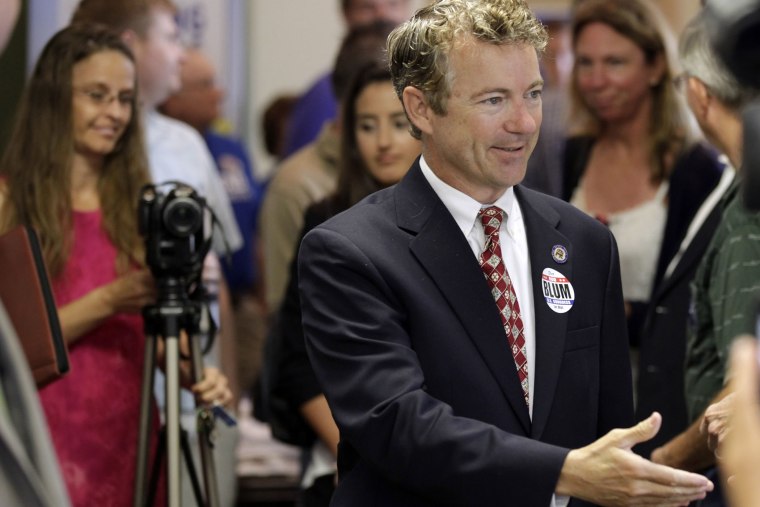Kentucky Republican Senator Rand Paul announced Tuesday morning that he'll be running in 2016 -- for a second term in the Senate, that is.
"I hope to continue together in the task of repairing and revitalizing our great nation," Paul said in his statement, touting the endorsement of Senate Majority Leader-Elect Mitch McConnell.
But this isn't just a precursor to Paul's expected presidential campaign -- it could actually derail it. Kentucky law says no one can run for two federal offices at once, meaning Paul can't hedge his bets in 2016 and keep his Senate seat if he loses the presidency, something he may want to do. (It's not uncommon, either: Vice President Joe Biden and Wisconsin Rep. Paul Ryan both successfully ran for vice president while on the ballot for Congressional offices.)
Paul and his team have been attempting to change the law, but when Democrats held control of the state's House last month, effectively scuttling their efforts to change the law on the books, they began considering other options. Arguing that the law is unconstitutional, the National Journal reports they've considered challenging the law in court, though that could backfire. Currently, the top option is abolishing the state's presidential primary in favor of a caucus system so Paul's name doesn't technically appear on a ballot, thus avoiding the letter of the law, which states "no candidate's name shall appear on any voting machine or absentee ballot more than once."
There's an added benefit to a caucus from Paul's perspective, as the state could move it up in the calendar to March, something that might help him gain momentum in a presidential race.
Paul hasn't formally declared his presidential ambitions (and according to the most recent CNN/ORC poll, few are jumping on his bandwagon just yet), but it's clear the Republican is heading in that direction.
His rhetoric in recent months has begun to build up his own candidacy and increasingly denigrated that of his presumed opponent, former Secretary of State Hillary Clinton.
The latter was clear on Tuesday, when during a Wall Street Journal/CEO Council, he again condemned the seven-month long Libyan intervention, declaring the country to be in a worse state than it was when the U.S. and more than a dozen other countries intervened.
"Look at Hillary’s war in Libya," Paul said. "Libya’s now chaotic, there are jihadists running everywhere, I think we’re less safe now."
He also hit back against a moderator's criticism that his anti-interventionist foreign policy would hurt him in a Republican primary.
"One, that fails to understand where people are in the country. But two- it also fails to understand who I am and what I support," Paul said, arguing the "non-intervention" view was widely held by Americans who still felt a strong defense was key. "This is not a small movement, nor is it easy to say that people like myself who believe in less intervention can be characterized as people who don't believe in a strong national defense. That's a caricature and I will have to fight that."
It was also clear in his latest Op-Ed in Breitbart on Benghazi.
Responding to the Republican-led House Intelligence Committee that cleared White House and State Department of wrongdoing in the 2012 terrorist attack on the Libyan embassy last week, Paul came out swinging, declaring Clinton culpable and his colleagues in the House stupid.
“[Y]es Hillary, it still matters,” Paul concludes in Breitbart, alleging a continued “cover up” in the terrorist attacks that left four Americans dead and declaring the “ultimate blame lies with the Obama administration and more directly with Hillary Clinton.”
RELATED: Rand Paul 2016 comes into focus
Paul's attempts to discredit both Clinton—the presumed Democratic frontrunner in 2016—and the committee that cleared her. (“It might be time to rename the House “Intelligence” Committee,” he writes.) aren't new, but it does signal both Paul's ambitions and just how much report guts the GOP’s favorite attack on Clinton.
“The House Intelligence Committee released its long-awaited Benghazi report Friday, claiming, “There was no intelligence failure prior to the attacks.” This one sentence tells us how seriously we should take this report,” Paul writes. “Benghazi was the definition of an intelligence failure.”
While Paul says this is the latest in a “cover up” and he’ll keep “searching for truth,” his own party says there’s nothing to see here.
“For over two years, the House Permanent Select Committee on Intelligence exhaustively investigated the September 11, 2012 terrorist attacks in Benghazi Libya,” Committee Chairman Mike Rogers and Ranking Member C.A. Dutch Ruppersberger said in a joint statement. “We also concluded that there was no intelligence failure prior to the attacks.”
